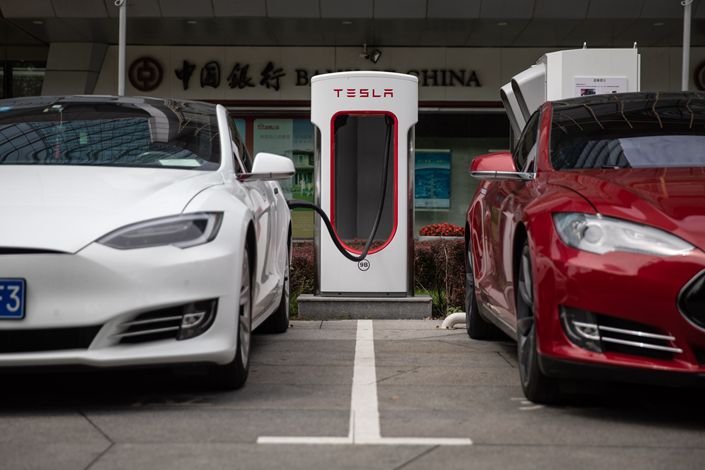Musk Says Shanghai Tesla Factory to Be Funded With Local Debt

Electric-car maker Tesla Inc. has said it will use local debt to fund its factory in Shanghai, the company’s first outside the U.S.
The factory — dubbed the Gigafactory 3 —– will be largely funded through local debt, according to a letter CEO Elon Musk sent to shareholders on Wednesday. The letter offered no specifics regarding the debt.
In a conference call on the same day, Musk said the factory — on which construction is expected to start within the next few quarters — will cost less than half of the initial estimate of $5 billion. “I think we learned a tremendous amount with Gigafactory 1; it’s probably closer to $2 billion,” said Musk, referring to a Tesla factory in Nevada.
Last month, Tesla signed agreements with the Shanghai authorities to set up a vehicle assembly plant in the city.
The capacity of the factory will grow from the initial stage of about 250,000 vehicles to 500,000 eventually. The first cars are expected to roll off the production line in about three years, according to Musk.
The establishment of Tesla’s China factory comes at a time when trade tensions between the U.S. and China have rattled the auto industry. In May, Beijing announced reduced import duties for select cars to 15% from 25%, prompting Tesla to cut the prices of its Model X and Model S vehicles sold in the country by about 6%. However, Tesla jacked the prices of its electric cars back up after Beijing raised the auto levy from 15% to 40% last month in retaliation for the U.S. government’s new tariffs on $34 billion of Chinese goods.
Musk implied that the trade tensions have posed a challenge to his company’s performance in the country, a market that contributes more than 15% of its revenue.
“While tariffs on vehicle imports to China have recently decreased to 15%, imports specifically from the U.S. have increased to 40%.” said Mush, adding that Tesla had to adjust pricing in China in order to partially offset this increased cost.
“This will likely have some negative impact on our volumes in China in the near term,” he added.
Contact reporter Mo Yelin (yelinmo@caixin.com)

- 1Cover Story: China Carves Out a Narrow Path for Offshore Asset Tokenization
- 2Drownings Shake Chinese Enthusiasm for Travel to Russia
- 3Over Half of China’s Provinces Cut Revenue Targets
- 4Li Ka-Shing’s Port Empire Hit by Forced Takeover Amid Panama Legal Dispute
- 5In Depth: China’s Mutual Fund Industry Faces Overhaul After a Banner 2025
- 1Power To The People: Pintec Serves A Booming Consumer Class
- 2Largest hotel group in Europe accepts UnionPay
- 3UnionPay mobile QuickPass debuts in Hong Kong
- 4UnionPay International launches premium catering privilege U Dining Collection
- 5UnionPay International’s U Plan has covered over 1600 stores overseas






